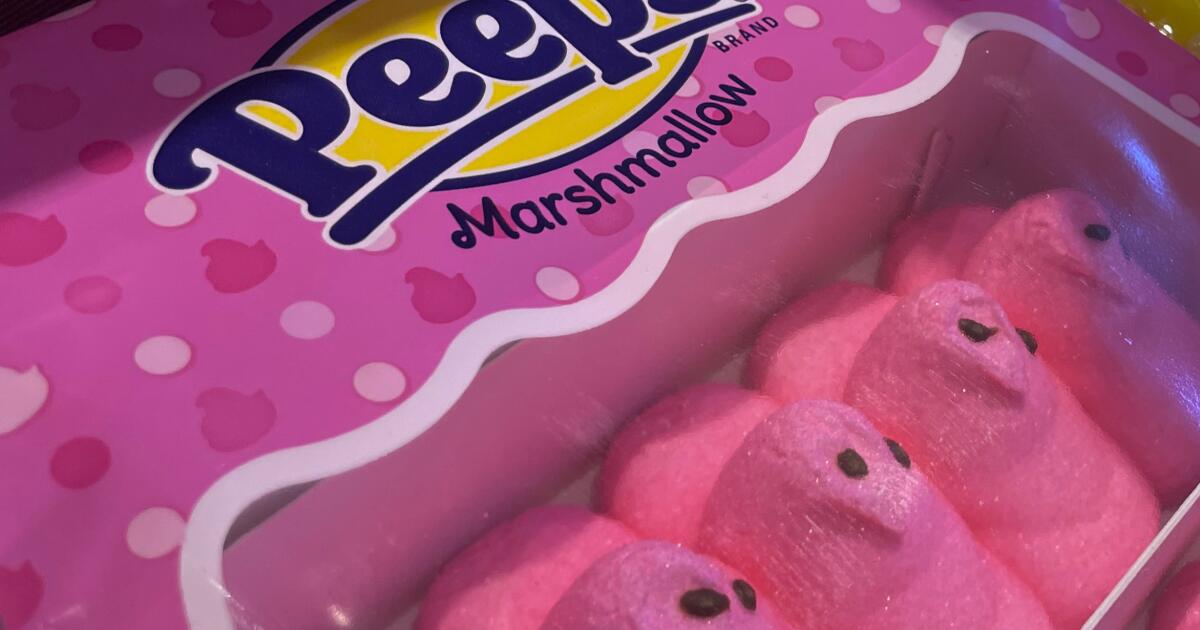California became the first state in the nation to prohibit four food additives found in popular cereal, soda, candy and drinks after Gov. Gavin Newsom signed a ban on them Saturday.
The California Food Safety Act will ban the manufacture, sale or distribution of brominated vegetable oil, potassium bromate, propylparaben and red dye No. 3 — potentially affecting 12,000 products that use those substances, according to the Environmental Working Group.
The legislation was popularly known as the “Skittles ban” because an earlier version also targeted titanium dioxide, used as a coloring agent in candies including Skittles, Starburst and Sour Patch Kids, according to the Environmental Working Group. But the measure, Assembly Bill 418, was amended in September to remove mention of the substance.
Kinda weird this has to be done at the bill level, there isn’t a health agency that monitors these things and bans as necessary?
There is the Food & Drug Administration (FDA) and normally that’s their purview, but they’re probably a bit more lax and industry-friendly, so more likely to let that stuff slide. California is a bit more progressive and health-conscious, and they’re a big enough market that when they say they’re gonna ban something, it essentially becomes banned for everybody else. Businesses won’t develop CA and non-CA products, they’ll just rework whatever it is to conform with CA’s demands.
The FDA did step in I believe when states starting talking about introducing different labeling standards and having different requirements for what needed to be called out, because it would’ve turned into a nightmare if you had to manage 50 different sets of labeling requirements.
If the FDA let’s industry produce toxic food that gives people cancer then I’d argue that the FDA is useless.
It’s just a other agency that is paid off by corporations to look the other way so they can continue exploiting Americans for massive gains.
There’s a long road between “you’ve put lead in your pasta as a sweetener!” and “you’ve but XYS-32 in your candy and it may cause cancer eventually.”
The FDA is much more concerned with immediate and serious threats and is still very much necessary.
Nothing is that black and white.
The FDA was created to enforce standards of sanitation and prevent false advertising in medicine (e.g. snake oil). The whole, “banning toxic additives” came later after science started understanding physiological dependence and addictive substances (e.g. actual coke in Coca-Cola).
Really, the FDA is an evolution of a lot of preceding government bodies and there’s a lot of history involved that they don’t cover in school 🤷
There is, but banning these substances is a political process not a scientific one. It’s definitely true that this should be done by experts and not politicians.
The thing is that it’s impossible to set up an experiment to show that something is safe. All you can do is collect more evidence that something is not dangerous. This leads to GRAS.
There’s also the additional fact that the dosage makes the poison. There is no substance for which a single molecule can harm you meaningfully.
Roundup is about as toxic as tablesalt. Caffeine is vastly more toxic than that. And Tylenol, well, that simply wouldn’t be approved if it were invented today. The ratio between the therapeutic dose and the lethal dose is too small.
Then there’s tradition and utility.
Plenty of herbal supplements and even foods are quite dangerous but are sold because they always were and they are “natural”.
We can all agree that certain substances don’t belong in food - either because they are useless or there’s strong evidence they’re harmful.
It’s the useful ones for which there is some evidence that they may cause issues when given in extreme doses, but a vast number of substances exhibit that behavior. Caffeine and Tylenol, for example. You do not think of these as poisons, but they are. Caffeine is so dangerous that you have to go through a lot of trouble to get it in its pure form.
The fact is that those supstances are certainly more dangerous than the substances in the article, but people are not clamoring to ban them.
And all this complexity is before people’s individual interests are involved.
This is why when you compare, say, us and eu food regulations you find substances that are on one list and not the other. One is not a superset of the other.
Anyway, these substances are not “toxic” in really any correct usage of the term, and it’s probably very unlikely that a ban will make anyone healthier or happier, despite what you may read about when you Google these substances. Even if you go to the scientific level.
Scientists can have their own agenda. They’re still people. Or they can just be bad scientists. Or they can just be churning out papers as fast as possible to increase their prestige.
It used to be that the top paper that came up (it may still be up in the list) when you search glyphosate and bees was a bad paper. It did correctly conclude that glyphosate killed the bees when they put it in the honey, but they had to put so much in there in order to see any effect at all that the concentration was high enough to actually kill aquatic weeds. Next it wasn’t properly controlled. Do you know what else will kill bees if put it in their honey? Water. And most definitely caffeine. I assure you a very small amount of caffeine in honey will kill a nest.
It’s just a political thing with good optics because who can argue with banning a “toxic” substance.
Are bees typically used to find the toxicity of a substance for humans? I thought that was rats or something.
They were trying to link glyphosate to colony collapse disorder.
Yeah, you’d typically use rats or mice.
Roundup is about as toxic as tablesalt
there’s a medium artificial with the same title if anyone is interested. (1 minute google search)
For sure, a must read. The OP who referred to it, clearly didn’t. Not you, Hello Hotel, thanks for the link.
You seem to have missed my meaning.
I have no disagreement with that article, except the tone.
I hadn’t heard about the article before, but frankly, the topic is part of what I was trying to convey.
Your intentions were clear.
That it’s not as simple as saying “something is as safe as table salt”?
You seem to have missed that.
Roundup is about as toxic as tablesalt. Caffeine is vastly more toxic than that. And Tylenol, well, that simply wouldn’t be approved if it were invented today. The ratio between the therapeutic dose and the lethal dose is too small.
The explanation by the PhD basically explains how your argument is absolutely flawed.
There is no substance for which a single molecule can harm you meaningfully.
Prions would like a word.
Awesome! Glad to have this added to the conversation.
I actually had this thought and was thinking about adding something like this earlier today.
You’re technically correct, in a sense. There still needs to be lots of these to cause problems. If there aren’t lots, there’s no problem.
It would be the same for any self replicating thing. Bacteria, viruses, fungi, and prions, but they replicate. I will grant you a single large parasite could do this, but at that point, we’re talking about tigers and such as a technicality as well.
Potentially one of these things could cause problems by reproducing. I think it’s just unlikely. I don’t know how we could demonstrate that though. I imagine a single virus or bacterium can lead to disease. I just suspect the probability is low.
Like you, my first thought was prions, but they have to actually come into contact with the protein to catalyze its misfolding. That’d be rare in the protein soup, I suppose.
Anyway. Nice comment!
It would be the same for any self replicating thing. Bacteria, viruses, fungi, and prions, but they replicate. I will grant you a single large parasite could do this, but at that point, we’re talking about tigers and such as a technicality as well.
None of the things you’ve listed here are single molecules except for the prion. A single cell, even for simple organisms, is made up of millions of proteins. Viruses come close, but are still made up of the nucleus and the capsid.
A protein could be considered a single molecule, but it also could not.
Molecule is hardly the right term for most things, e.g. polonium or salt.
I intended to be more general but didn’t want to go further of into the weeds. I considered 1 unit, but that’s misleading.
Let’s go with the etymology of molecule: small amount.
All proteins are not singular molecules, but the ones that are… are. Proteins are actually classified partly by if they are a single molecule or several (quartenary structure). Polymers, as long as the chain of bonds isn’t broken, are giant molecules by definition.
I get what you mean here, that a single molecule doesn’t cause harm and quantity matters, and I agree. It would just be technically correct to say non-polymer molecules.
Y’know technically, you are right. I forget that proteins can be singular molecules.
Scientists can have their own agenda. They’re still people. Or they can just be bad scientists. Or they can just be churning out papers as fast as possible to increase their prestige.
It’s interesting to me, that if you had said this exact phrase in relation to climate change research, or any other politically divisive science, you would have been down voted to oblivion, but when talking about this, you got up voted. What you’ve written here is true regardless of the subject matter, but when it comes to agendas, it’s even more true in politically divisive science.
Yeah… I’m fine being a liberal, but this place is toxic.
I’m not sure how much longer I’ll tolerate it.
It’s just too many angry, ignorant people unwilling to accept challenges to their beliefs.
Just because your beliefs are left wing doesn’t mean you shouldn’t question them.
If you had the largest molecule made entirely of antimatter, would it annihilate with enough energy to be dangerous?
Those agencies are toothless. Even under Biden, they’re rebuilding those agencies and just crossing their fingers that they aren’t torn apart again in 2024 or 2028.
Any state health agency would fall under the executive branch of government. The power of creating laws is under the legislative branch (like the Senate). Executive agencies have the authority to enforce laws and under Chevron Deference the authority to interpret laws where vague, but not form new laws.
For example, if a bill was passed saying cars can’t be louder than 110 dBs an executive agency could decide the proper way of measuring volume, if not prescribed by law.
I’d think the Legislative would set up a health agency empowered to ban “toxic food additives”, and let the agency determine which ones are toxic. Otherwise, the Legislative branch has to ban every individual thing.
Legislators create committees, and they frequently don’t have many people who care about the issue. Committees are usually… Bipartisan. And not often about effectiveness but about prestige, and lobbying.
I believe the executive branch can suggest new laws, but they would still have to pass through the state’s legislative branch. The suggested law may still need to be formally introduced by a member of the legislative branch, though.
The legislative process of each state is largely derived from the legislative process of the federal government, but there are probably some variations between states.
Dissapointed that I don’t see Olestra on that list.
Those of us alive in the 80s may never forget the term “anal seepage” associated with it.
For anyone interested in trying to avoid bad stuff, there’s this free app called Yuka I’ve been using for a year or so now where you can scan foods and other products and it gives them a score and a comprehensive breakdown of the additives and overall health of the food with linked sources.
Free… With limits. Charging a $10 subscription to use a search function is disgusting.
Consider the resources it takes to maintain, update, and query a large amount data, the $99 yearly app store fee, development of the app, and plain usefulness of it. That seems pretty generous to me, especially with how much is free to use.
No. I won’t consider it. One time purchase or bust.
I have this app too. It’s depressing how many foods I actually enjoy have additives in them.
Yeah seriously, it’s a similar feeling when I realize yet another brand is now owned by Nestle
All processed foods have additives for taste, shelf life or looks. Even if they aren’t listed on the ingredient breakdown because they are classified as “manufacturing aids”, a loop hole that the food industry created for themselves.
Sorry…I should have said harmful additives.
Wait so eating titanium is ok still?
There seems to be some disagreement, but TiO2 (a very white pigment powder) is generally considered safe and has been used in everything from wall paint to toothpaste for decades. A few studies have suggested possible genetic toxicity, but it may be only from the extremely small nano-particle form. Another study suggested lung problems much like asbestos, but that might be from breathing high level aerosol concentrations. All in all, there’s no clear consensus, which seems like a pretty good sign for such a commonly used material, but the jury is still out.
My understanding is the substance itself is okay, it’s the particulate matter form which is a problem.
Which is a whole different thing entirely, and I wish we had a way to distinguish between them for the public.
If the food conglomerates are whining then there is truth to the legislation.
This is the right move, I just wish it was done decades ago when we knew these additives were problematic. Like how many lives have been impacted since we knew? I wish karma was a thing as those who knew and carried on as is, have blood on their hands.
Well this follows the example of Europe, UK and Canada on dealing with toxic ingredients.
Well great. If I can’t count on my food choices to kill me some day, what am I even eating food for. At least saturated fats are still legal.
Saturated fats are healthy. Just sayin’.
No they are not
1950s called, they want their science back
You don’t need to eat saturated fat because your body already makes it. Yes eating it in moderation will not harm you, but it will not benefit you either unless you have a deficiency.
Saturated fat is part of a healthy diet. Too much of it is bad. But too little of it is also bad. Balance is the most healthy thing.
Welp, I’m gonna check my pantry now for any of these ingredients.
These aren’t the only toxic additives allowed in food in the US by the way but it’s a good start. On account of Google no longer being a search engine I have attempted to find you a more comprehensive list and given up after looking at the first 3 links since they don’t go anywhere that looks reputable. Maybe someone else knows a good source for us?
Someone above linked Yuka.
You should try AltaVista or Ask Jeeves
I’m a fan of Lycos.
Ecosia! Plant some trees with your curiosity
might be worthwhile running the border with a shipment of candy/potato chips/twinkies - the black market for snacks is going to be just as huge as the illegal drugs market.
deleted by creator
I hope it won’t go the way of the “may contain carcinogens” warning label.
Ahhh but I don’t have enough cancer yet :( On a serious note, sometimes people shit talk California but they have a massive economy and when they do things like this it has a huge positive benefit for the entire country. Most companies will just reformulate instead of having California specific products so everyone benefits.
Do these cause cancer in the usage and quantity they are consumed in?
Or is this more California “everything causes cancer” BS?
The FDA banned the use of Red Dye #3 in cosmetics over 30 years ago because it causes cancer in animal models. But it was never banned in food. That is either beholden to big business, downright stupid, or both. More info here: https://www.consumerreports.org/health/food-additives/red-dye-3-banned-in-cosmetics-but-still-allowed-in-food-a3467381365/
That is either beholden to big business, downright stupid, or both.
If yoyu want an even more blatant example of this, look into the history of stevia and the FDA. Which includes fun stuff like the FDA burning crates of herbal tea because that tea contained stevia, declaring it an unsafe food additive seemingly entirely because NutraSweet wanted them to, and not that much later creating rules that allowed it to be sold to any one in any quantity for any reason as an “herbal dietary supplement”, but only so long as you didn’t mention that it had a flavor. Mentioning that it was sweet tasting transformed it from an herbal dietary supplement that’s basically harmless into a dangerous unsafe food additive.
Thanks!
Do these have strong safety studies backing them or is this just more FDA accepting corporate bribes bs again?
To me this is amazing news, I am allergic to Red Dye #3. If I eat something that has it, within seconds my throat closes and I can barely breathe. The worst part is that there is no need to use it. Sweet Tarts for example uses beets to get the red coloring in their candy.
Yep! I had problems with one of those red dyes as a kid. Made me go ape shit mode and I was violent every single time I had a candy with it. Then all the other time I was hyperactive but harmless.
Well that’s terrifying. If you don’t live in California you’ll still have to watch for it after the law takes affect but it should be used a lot less.
Most brands will reformulate and all their products will be compliant rather than making a California only version and a rest of the us version. They aren’t going to just stop serving California either, it’s the largest economy in the nation and if it was on its own it would be roughly equivalent to Germany gdp wise
Yes, but counting on that when you have a life-threatening allergy isn’t the smartest move.
If you have a life threatening allergy you should be reading the ingredients of everything regardless
Of course we are nott saying that he should stop checking, just that it probably will be used in
lessfewer products.*fewer products
Thank you. Less vs fewer is one that bothers my brain.
How… was the process of identifying that very specific allergy?
Those big allergen patch tests they do, probably
Sadly these did not work to detect it for me.
Those can be kind of hit & miss for food allergies. They prick your back with them, but if your allergic reactions happen in, say, your throat, there’s a good chance you won’t show as allergic. I found the pollen/dander prick test to be a lot more accurate than the food test.
According to the one I took, I’m allergic to both pineapple and mushrooms, which I’m not. Also according to the test, I’m not allergic to any tree nuts at all, which eating those make my lips/mouth/throat swell and itch, in addition to making it hurt/difficult to breathe.
So yeah, ymmv.
I started to to compare ingredient lists from packages of candy and it was the only thing that was on all of them.
The bromate ingredients are only dangerous if the factory fucked up during production as well. If they’re doing their job correctly, there is no bromate in your food.
It’s sort of like how you don’t have to worry about food poisoning from chicken when it’s cooked through, even though it’s not recommended to risk eating the raw stuff.
No idea about the other two banned ingredients, but the risk seems pretty low for these at least. I wouldn’t bother throwing food away over their presence, personally, but that’s just me.
Edit: too tired
“The bromate ingredients are only dangerous if the factory fucked up during production as well. If they’re doing their job correctly, there is no bromine in your food.”
Idk if that’s true or not so not commenting on that portion. However, “I wouldn’t bother throwing food away over their presence, personally, but that’s just me.” We all have different risk tolerances so that’s fine. What isn’t fine is that the FDA makes a practice of taking corporate bribes, allowing flawed or outright manipulated studies, etc and then suddenly approving foods, additives, drugs, that are known or strongly suspected to be unsafe. For example, Donald Rumsfeld (sound familiar?) was a food company exec who really really wanted aspartame approved but they were having trouble getting through the approval process because it wasn’t easily demonstrable that the product was safe. Rumsfeld gets added to Ronald Reagan’s transition team and suddenly it’s approved. Scary stuff. It’s been approved in other countries so mayyyybe it’s fine but the history of its approval is appalling and simply proves that the FDA isn’t always looking out for the best interest of society at large. So if a state like CA steps in and says “holy shit don’t eat this”, I’m listening.
One source: “Ronald Reagan was sworn in as president January 21, 1981. Rumsfeld, while still CEO at Searle, was part of Reagan’s transition team. This team hand-picked Dr. Arthur Hull Hayes, Jr., to be the new FDA commissioner. Dr. Hayes, a pharmacologist, had no previous experience with food additives before being appointed director of the FDA. On January 21, 1981, the day after Ronald Reagan’s inauguration, Reagan issued an executive order eliminating the FDA commissioners’ authority to take action and Searle re-applied to the FDA for approval to use aspartame in food sweetener. Hayes, Reagan’s new FDA commissioner, appointed a 5-person Scientific Commission to review the board of inquiry’s decision. It soon became clear that the panel would uphold the ban by a 3-2 decision. So Hayes installed a sixth member on the commission, and the vote became deadlocked. He then personally broke the tie in aspartame’s favor.”
What isn’t fine is that the FDA makes a practice of taking corporate bribes, allowing flawed or outright manipulated studies, etc and then suddenly approving foods, additives, drugs, that are known or strongly suspected to be unsafe.
Yeah, corruption isn’t fine. I don’t live on that continent though, so, I’m afraid I can’t help you out much with Donald Rumsfeld. I just like accuracy in my science and proportionate anxiety about risks.
No worries, Donald Rumsfeld is dead now. He did a LOT of damage to the rest of the world before he kicked it though. He was the US Secretary of Defense for George W Bush.
Yes, I remember not being upset by the news of his passing.
And now we have a wealth of resources confirming that aspartame is indeed safe, so I’m not sure why this story is relevant.
https://www.wcrf.org/latest/news-and-updates/statement-on-aspartame/
Peeps.
Why did it have to be peeps.
Peeps aren’t for eating. They’re much more enjoyable to light on fire.
I haven’t tried it.
Yet.
Peep S’mores.
the fact that its
… “toxic” food additives
and not
… “toxic food additives”
makes me think the one who made the title inserted their opinions.















